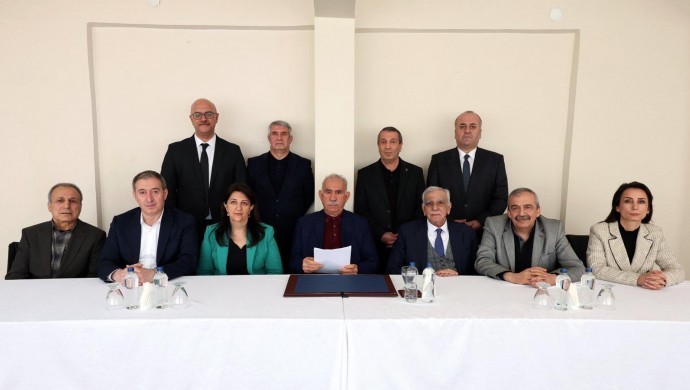Abdullah Öcalan, the jailed founder and leader of the outlawed Kurdistan Workers’ Party (PKK), on Thursday called for his Kurdish militant group to lay down its arms and disband, in a landmark declaration read out in İstanbul, Agence France-Presse reported.
“All armed groups must lay down their arms and the PKK must disband,” he said in a declaration read out by a delegation of lawmakers from the pro-Kurdish Peoples’ Equality and Democracy Party (DEM Party) who visited him in prison earlier in the day.
The Kurdish version of Öcalan’s statement was read out by veteran politician Ahmet Türk, while DEM Party lawmaker Pervin Buldan read out it in Turkish at a news conference at an İstanbul hotel.
Öcalan said he was taking the “historic” responsibility of his call while offering his thanks to President Recep Tayyip Erdoğan and far-right Nationalist Movement Party (MHP) leader Devlet Bahçeli for their support to achieve peace.
“The call made by Mr. Devlet Bahçeli, along with the will expressed by Mr. President and the positive responses from political parties towards the anticipated call, have created an environment in which I am making a call for the laying down of arms, and I take on the historic responsibility of this call,” Öcalan said in the statement.
He urged the PKK to convene a congress and formally decide on the laying down of arms, adding, “As in the case of any modern community and party whose existence has not been abolished by force, you must voluntarily convene your congress and make a decision: All groups must lay down their arms, and the PKK must dissolve itself.”
In his message, Öcalan also talked about the reasons behind the PKK’s armed struggle, including the state’s refusal to recognize a Kurdish identity, adding that there was no longer any reason for armed conflict.
Founded by Öcalan in 1978, the PKK has led a bloody war in Turkey’s southeast since 1984. The group is considered a terrorist organization by Turkey and its Western allies.
“There is no alternative to democracy in the pursuit and realization of a political system. Democratic consensus is the fundamental way,” the PKK leader said in his message.
In the Kurdish-majority city of Diyarbakır in the southeast, where around 3,000 people had gathered at a square to listen to an audio broadcast of Öcalan’s call, some broke into spontaneous applause while others broke down in tears.
However, Öcalan did not specify what steps, if any, the Turkish government would take to address Kurdish demands for broader political and cultural rights. He also did not mention any preconditions for the PKK to lay down its arms.
DEM Party lawmaker Sırrı Süreyya Önder, a member of the peace delegation who delivered the opening and closing remarks at Thursday’s news conference, said Öcalan shared a note with the delegation at the end of their four-hour meeting earlier in the day.
According to the note, Öcalan said, without elaborating, “… the abandoning of arms and the dissolution of the PKK undoubtedly require the recognition of democratic politics and its legal framework.”
Öcalan, 75, has been serving a life sentence without parole on İmralı Island since his arrest in Nairobi in February 1999.
Since his detention there have been various attempts to end the bloodshed that erupted in 1984 and has cost more than 40,000 lives. The last round of talks collapsed in a storm of violence in 2015.
After that, there was no contact until October, when MHP leader Bahçeli offered Öcalan a surprise peace gesture if he would reject violence in a move endorsed by President Erdoğan.
Since then, a DEM Party delegation has visited Öcalan and later briefed parliamentary parties on the discussions. The delegation made their third visit to Öcalan earlier on Thursday.
The contact fueled a growing anticipation that Öcalan would call on his militants to lay down their arms in exchange for concessions for Turkey’s Kurdish population.
Thursday’s delegation included DEM Party Co-chairs Tülay Hatimoğulları and Tuncer Bakırhan and veteran Kurdish politician Ahmet Türk, 82, who has a long history of involvement in efforts to resolve the Kurdish issue.
DEM Party lawmakers Önder and Buldan, who were both part of the earlier delegations, also attended the Thursday meeting with Öcalan, as did another DEM Party lawmaker.


